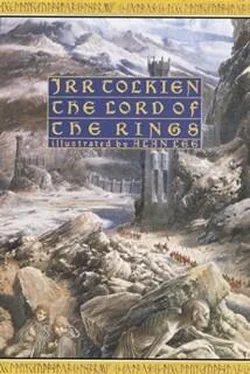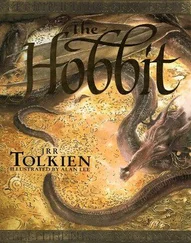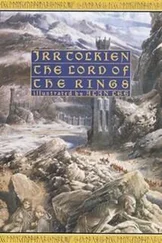John Tolkien - The Return of the King
Здесь есть возможность читать онлайн «John Tolkien - The Return of the King» весь текст электронной книги совершенно бесплатно (целиком полную версию без сокращений). В некоторых случаях можно слушать аудио, скачать через торрент в формате fb2 и присутствует краткое содержание. Жанр: Фэнтези, на английском языке. Описание произведения, (предисловие) а так же отзывы посетителей доступны на портале библиотеки ЛибКат.
- Название:The Return of the King
- Автор:
- Жанр:
- Год:неизвестен
- ISBN:нет данных
- Рейтинг книги:5 / 5. Голосов: 1
-
Избранное:Добавить в избранное
- Отзывы:
-
Ваша оценка:
- 100
- 1
- 2
- 3
- 4
- 5
The Return of the King: краткое содержание, описание и аннотация
Предлагаем к чтению аннотацию, описание, краткое содержание или предисловие (зависит от того, что написал сам автор книги «The Return of the King»). Если вы не нашли необходимую информацию о книге — напишите в комментариях, мы постараемся отыскать её.
The Return of the King — читать онлайн бесплатно полную книгу (весь текст) целиком
Ниже представлен текст книги, разбитый по страницам. Система сохранения места последней прочитанной страницы, позволяет с удобством читать онлайн бесплатно книгу «The Return of the King», без необходимости каждый раз заново искать на чём Вы остановились. Поставьте закладку, и сможете в любой момент перейти на страницу, на которой закончили чтение.
Интервал:
Закладка:
'But it is said that when au was lost suddenly the Witch-king himself appeared, black-robed and black-masked upon a black horse. Fear fell upon all who beheld him; but he singled out the Captain of Gondor for the fullness of his hatred, and with a terrible cry he rode straight upon him. Earnur would have withstood him; but his horse could not endure that onset, and it swerved and bore him far away before he could master it.
'Then the Witch-king laughed, and none that heard it ever forgot the horror of that cry. But Glorfindel rode up then on his white horse, and in the midst of his laughter the Witch-king turned to flight and passed into the shadows. For night came down on the battlefield, and he was lost, and none saw whither he went.
'Earnur now rode back, but Glorfindel, looking into the gathering dark, said: "Do not pursue him! He will not return to this land. Far off yet is his doom, and not by the hand of man will he fall." These words many remembered; but Earnur was angry, desiring only to be avenged for his disgrace.
'So ended the evil realm of Angmar; and so did Earnur, Captain of Gondor, earn the chief hatred of the Witch-king; but many years were still to pass before that was revealed.'
It was thus in the reign of King Eärnil, as later became clear, that the Witch-king escaping from the North came to Mordor, and there gathered the other Ringwraiths, of whom he was the chief. But it was not until 2000 that they issued from Mordor by the Pass of Cirith Ungol and laid siege to Minas Ithil This they took in 2002, and captured the palantír of the tower. They were not expelled while the Third Ago lasted; and Minas Ithil became a place of fear, and was renamed Minas Morgul. Many of the people that still remained in Ithilien deserted it.
'Earnur was a man like his father in valour, but not in wisdom. He was a man of strong body and hot mood; but he would take no wife, for his only pleasure was in fighting, or in the exercise of arms. His prowess was such that none in Gondor could stand against him in those weapon-sports in which he delighted, seeming rather a champion than a captain or king, and retaining his vigour and skill to a later age than was then usual.'
When Earnur received the crown in 2043 the King of Minas Morgul challenged him to single combat, taunting him that he had not dared to stand before him in battle in the North. For that time Mardil the Steward restrained the wrath of the king. Minas Anor, which had become the chief city of the realm since the days of King Telemnar, and the residence of the kings, was now renamed Minas Tirith, as the city ever on guard against the evil of Morgul.
Earnur had held the crown only seven years when the Lord of Morgul repeated his challenge, taunting the king that to the faint heart of his youth he had now added the weakness of age. Then Mardil could no longer restrain him, and he rode with a small escort of knights to the gate of Minas Morgul. None of that riding were ever heard of again. It was believed in Gondor that the faithless enemy had trapped the king, and that he had died in torment in Minas Morgul; but since there were no witnesses of his death, Mardil the Good Steward ruled Gondor in his name for many years.
Now the descendants of the kings had become few. Their numbers had been greatly diminished in the Kin-strife; whereas since that time the kings had become jealous and watchful of those near akin. Often those on whom suspicion fell had fled to Umbar and there joined the rebels; while others had renounced their lineage and taken wives not of Númenorean blood. So it was that no claimant to the crown could be found who was of pure blood, or whose claim all would allow; and all feared the memory of the Kin-strife, knowing that if any such dissension arose again, then Gondor would perish. Therefore, though the years lengthened, the Steward continued to rule Gondor, and the crown of Elendil lay in the lap of King Eärnil in the Houses of the Dead, where Earnur had left it.
The Stewards
The House of the Stewards was called the House of Hurin, for they were descendants of the Steward of King Minardil (1621-34), Hurin of Emyn Arnen, a man of high Númenorean race. After his day the kings had always chosen their stewards from among his descendants; and after the days of Pelendur the Stewardship became hereditary as a kingship, from father to son or nearest kin.
Each new Steward indeed took office with the oath 'to hold rod and rule in the name of the king, until he shall return.' But these soon became words of ritual little heeded, for the Stewards exercised all the power of the kings. Yet many in Gondor still believed that a king would indeed return in some time to come; and some remembered the ancient line of the North, which it was rumoured still lived on in the shadows. But against such thoughts the Ruling Stewards hardened their hearts.
Nonetheless the Stewards never sat on the ancient throne; and they wore no crown, and held no sceptre. They bore a white rod only as the token of their office; and their banner was white without charge; but the royal banner had been sable, upon which was displayed a white tree in blossom beneath seven stars.
After Mardil Voronwe, who was reckoned the first of the line there followed twenty-four Ruling Stewards of Gondor, until the time of Denethor II, the twenty-sixth and last. At first they had quiet, for those were the days of the Watchful Peace, during which Sauron withdrew before the power of the White Council and the Ringwraiths remained hidden in Morgul Vale. But from the time of Denethor I, there was never full peace again, and even when Gondor had no great or open war its borders were under constant threat.
In the last years of Denethor I the race of uruks, black orcs of great strength, first appeared out of Mordor, and in 2475 they swept across Ithilien and took Osgiliath. Boromir son of Denethor (after whom Boromir of the Nine Walkers was later named) defeated them and regained Ithilien; but Osgiliath was finally ruined, and its great stone-bridge was broken. No people dwelt there afterwards. Boromir was a great captain, and even the Witch-king feared him. He was noble and fair of face, a man strong in body and in will, but he received a Morgul-wound in that war which shortened his days, and he became shrunken with pain and died twelve year after his father.
After him began the long rule of Cirion. He was watchful and wary, but the reach of Gondor had grown short, and he could do little more than defend his borders, while his enemies (or the power that moved them) prepared strokes against him that he could not hinder. The Corsairs harried his coasts, but it was in the norm mat his chief peril lay. In the wide lands of Rhovanion, between Mirkwood and the River Running, a fierce people now dwelt, wholly under the shadow of Dol Guldur. Often they made raids through the forest, until the vale of Anduin south of the Gladden was largely deserted. These Balchoth were constantly increased by others of like kind that came in from the east, whereas the people of Calenardhon had dwindled. Cirion was hard put to it to hold the line of the Anduin.
'Foreseeing the storm, Cirion sent north for aid, but over-late; for in that year (2510) the Balchoth, having built many great boats and rafts on the east shores of Anduin, swarmed over the River and swept away the defenders. An army marching up from the south was cut off and driven north over the Limlight, and there it was suddenly attacked by a horde of Orcs from the Mountains and pressed towards the Anduin. Then out of the North there came help beyond hope, and the horns of the Rohirrim were first heard in Gondor. Eorl the Young came with his riders and swept away the enemy, and pursued the Balchoth to the death over the fields of Calenardhon. Cirion granted to Eorl that land to dwell in, and he swore to Cirion the Oath of Eorl, of friendship at need or at call to the Lords of Gondor.'
Читать дальшеИнтервал:
Закладка:
Похожие книги на «The Return of the King»
Представляем Вашему вниманию похожие книги на «The Return of the King» списком для выбора. Мы отобрали схожую по названию и смыслу литературу в надежде предоставить читателям больше вариантов отыскать новые, интересные, ещё непрочитанные произведения.
Обсуждение, отзывы о книге «The Return of the King» и просто собственные мнения читателей. Оставьте ваши комментарии, напишите, что Вы думаете о произведении, его смысле или главных героях. Укажите что конкретно понравилось, а что нет, и почему Вы так считаете.












